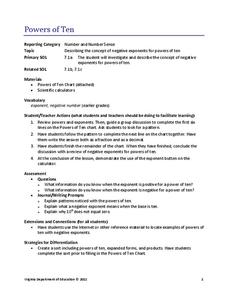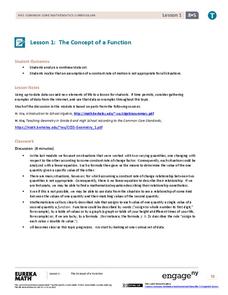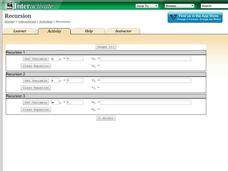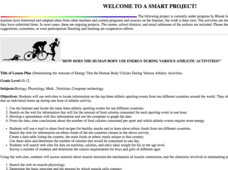iCivics
Lesson 3: Bias
How do journalists balance bias and ethical reporting? The final lesson in a series of five from iCivics examines the different types of bias and how they affect the news we read. Young reporters take to the Internet to find examples of...
Sunburst Visual Media
Clouds
Support science instruction with a combination of engaging activities and skills-based worksheets that focus on clouds. Learners take part in grand discussions, write an acrostic poem, complete graphic organizers, solve word...
Virginia Department of Education
Linear Modeling
An inquiry-based algebra lesson explores real-world applications of linear functions. Scholars investigate four different situations that can be modeled by linear functions, identifying the rate of change, as well as the...
National Council for the Social Studies
Analyzing a Product or Political Advertisement
How do advertisements evoke specific thoughts and feelings? Class members find out through the exploration of the Internet, videos, television, magazines, radio, and posters. Learners investigate commercial advertisements, political...
Virginia Department of Education
Powers of Ten
Investigate negative exponents of-ten. Pupils use the pattern of increasing powers of 10 to determine negative powers of 10. The scholars write the powers in expanded and product forms and make the connection to exponents using a...
EngageNY
The Concept of a Function
Explore functions with non-constant rates of change. The first installment of a 12-part module teaches young mathematicians about the concept of a function. They investigate instances where functions do not have a constant rate of change.
Shodor Education Foundation
Transmographer
Introducing ... the Transmographer. Young mathematicians investigate translations, reflections, and rotations. The applet lets users perform transformations on triangles, squares, and parallelograms.
Shodor Education Foundation
Cross Section Flyer
Scholars see cross sections come to life using an app to investigate cross sections of three-dimensional solids. They look at prisms, pyramids, cylinders, cones, and double cones.
Shodor Education Foundation
Recursion
Perform the operation ... and then do it again. Scholars investigate recursive formulas by creating and graphing them. Using the interactive, pupils set the variable, determine the initial value, and type in a recursive formula.The...
Shodor Education Foundation
Rabbits and Wolves
A change in a parameter can end in overpopulation. The resources gives pupils the opportunity to control the parameters of rabbits and wolves in a natural setting. Using the set parameters, the simulation runs and displays the population...
Hachette Children’s Group
Our Five Senses
Show your class how to experience their world with the five sense. With worksheets on each sense, learners investigate their surroundings and categorize them into sight, smell, touch, hearing, and taste.
Historical Thinking Matters
Spanish-American War: 5 Day Lesson
Nine historical documents, an interactive online notebook, and a fantastic opportunity for historical inquiry await your pupils in this 5-day lesson plan. Class members identify and discuss various causes for the Spanish-American War...
Curated OER
The Chesapeake Bay in Captain John Smith's Time
When Captain John Smith visited the Chesapeake Bay in the summer of 1608, what types of animals and habitats did he encounter? Your young historians will analyze primary source documents to answer this question, as well as compare...
Nemours KidsHealth
Obesity: Grades 3-5
What is obesity and what are some steps that can help? Investigate obesity by having your class read and discuss articles about obesity. Students gain knowledge about body mass index, the food pyramid, being overweight and dieting. They...
Nemours KidsHealth
Germs: Grades K-2
Students demonstrate knowledge about germs. In this health lesson, students investigate what germs are, how to protect the skin by comparing the skin to apple skins, and the proper hand washing technique for getting rid of germs....
Baylor College
Body Mass Index (BMI)
How do you calculate your Body Mass Index, and why is this information a valuable indicator of health? Class members discover not only what BMI is and practice calculating it using the height and weight of six fictitious individuals, but...
WolfQuest
The Return of Gray Wolves to Yellowstone National Park: Right or Wrong?
Should gray wolves be removed from Yellowstone National Park? After researching the complex relationships between the various habitats and species at Yellowstone National Park, including humans, class members take a position...
EngageNY
Informally Fitting a Line
Discover how trend lines can be useful in understanding relationships between variables with a lesson that covers how to informally fit a trend line to model a relationship given in a scatter plot. Scholars use the trend line to make...
University of Rhode Island
How Does the Human Body Use Energy during Various Athletic Activities?
Students investigate how much energy is used during different athletic activities. They conduct Internet research to obtain information on the top three athletic sporting events from around the world, and calculate the calories burned...
Project SMART
Dinosaur Trek
Second graders investigate dinosaurs. They explore various websites, submit questions to a paleontologist online, construct cut and paste model dinosaur skeletons, develop a graph to compare dinosaurs, and label pictures from online...
US National Archives
WWII: Western Europe 1939-45 – Hamburg
Was bombing German cities an effective means to an end, or was it a war crime? Could it be both? Young historians ponder these questions with an activity that prompts them to use primary sources to summarize the debate surrounding RAF...
Visa
Money Matters: Why It Pays to Be Financially Responsible
What does it mean to be financially responsible? Pupils begin to develop the building blocks of strong financial decision making by reviewing how their past purchases are examples of cost comparing, cost-benefit analysis, and budgeting.
Visa
Financial Forces: Understanding Taxes and Inflation
Take the opportunity to offer your young adults some important financial wisdom on the way taxes and inflation will affect their lives in the future. Through discussion and review of different real-world scenarios provided...
Visa
The Danger of Debt: Avoiding Financial Pitfalls
How can our perspectives of borrowing and returning influence the way we view credit? Pupils explore the concept of debt, how it impacts our ability to obtain credit, and finally the ways in which we can work to alleviate debt.























